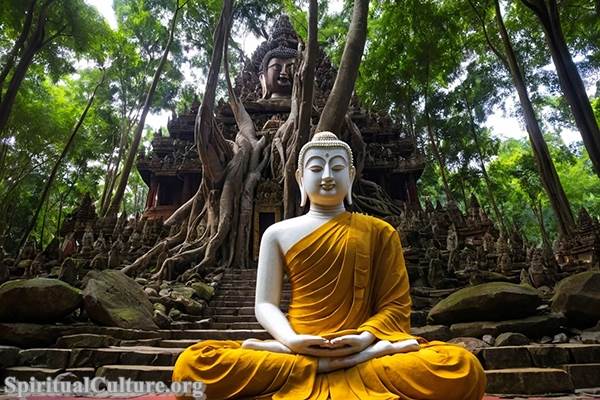Buddhism is a profound philosophy and a way of life that encourages self-discovery and consciousness of the world around us. It is a path that leads to spiritual enlightenment and personal growth. To define Buddhism is to delve into a rich tapestry of teachings, practices, and traditions that have evolved over more than 2,500 years.
Buddhism is not a religion in the traditional sense, as it does not worship a god or deity. Instead, it is a spiritual tradition that focuses on personal spiritual development and the attainment of a deep insight into the true nature of life. Buddhism encourages its followers to prevent and alleviate suffering, to increase happiness, wisdom, and compassion, and to improve their personal ability to respond skillfully to life’s challenges.

The birth of Buddhism dates back to the 6th century BC in India, when Siddhartha Gautama, also known as the Buddha, awakened to the reality of life, death, and existence. Since then, Buddhism has spread across the globe, with an estimated 500 million followers, making it the fourth largest religion in the world.
Buddhism is characterized by several key concepts, including the Four Noble Truths, the Noble Eightfold Path, Karma, and Nirvana. The Four Noble Truths comprise the essence of Buddha’s teachings. They define the nature of suffering, its causes, its cessation, and the path leading to the cessation of suffering. The Noble Eightfold Path is the method by which followers can achieve liberation from suffering. It includes right view, right intention, right speech, right action, right livelihood, right effort, right mindfulness, and right concentration.
Karma, another significant concept in Buddhism, refers to the law of cause and effect. It suggests that every action has a consequence, and these actions directly influence our present and future experiences. Nirvana, on the other hand, is the ultimate goal of Buddhism. It is a state of liberation and freedom from suffering.
Buddhism is also unique in its approach to the self and consciousness. It does not believe in an eternal, unchanging soul. Instead, it proposes the idea of ‘anatman’ or ‘no-self.’ According to Buddhism, what we consider ‘self’ is merely a collection of changing characteristics or ‘skandhas,’ which include form, sensation, perception, mental formations, and consciousness. This perspective encourages detachment from the ego and promotes a deeper understanding of reality.
There are three main branches of Buddhism: Theravada, Mahayana, and Vajrayana. Theravada Buddhism, also known as the ‘School of the Elders,’ is the oldest form of Buddhism and is prevalent in countries like Sri Lanka, Thailand, and Myanmar. Mahayana Buddhism, ‘the Great Vehicle,’ is the largest branch of Buddhism and is practiced in East Asia, including China, Japan, and Korea. Vajrayana Buddhism, ‘the Diamond Vehicle,’ is primarily practiced in Tibet and Mongolia.
In conclusion, to define Buddhism is to understand its profound teachings and practices that aim to alleviate suffering and promote compassion, wisdom, and inner peace. It is a path of self-discovery and spiritual development, offering guidance on how to live a fulfilling and meaningful life. Despite its diverse interpretations and practices, the core teachings of Buddhism remain the same, focusing on the principles of kindness, compassion, and mindfulness. Whether one chooses to follow Buddhism as a religion, a philosophy, or a way of life, its timeless wisdom offers invaluable insights into the human condition and the world we live in.



